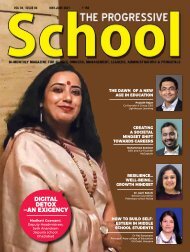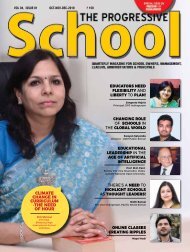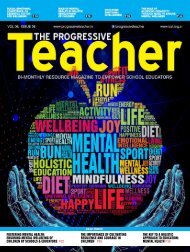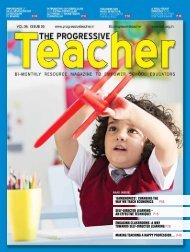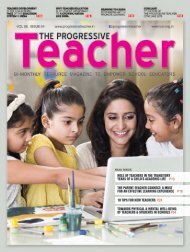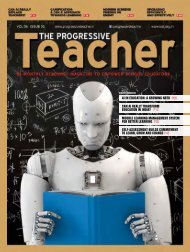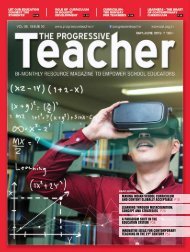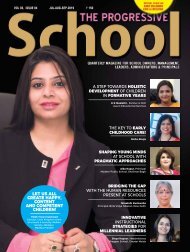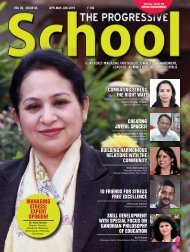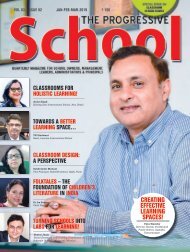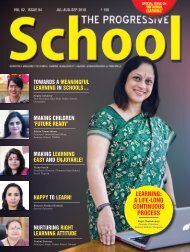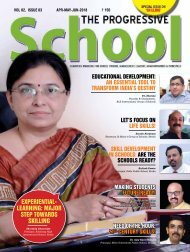The Progressive Teacher Vol 03 Issue 05
This issue of The Progressive Teacher focuses on "Teaching of Social Studies". The magazine provides guidance to the teachers by their peers and school leaders for tackling challenges with innovative ideas.
This issue of The Progressive Teacher focuses on "Teaching of Social Studies". The magazine provides guidance to the teachers by their peers and school leaders for tackling challenges with innovative ideas.
Create successful ePaper yourself
Turn your PDF publications into a flip-book with our unique Google optimized e-Paper software.
learning<br />
Vocabulary, a challenge<br />
for students-in context<br />
Waning vocabulary among students is one of the key concerns raised<br />
by language teachers during all my interactions with them. <strong>The</strong> fading<br />
skill has been a unanimous motif in all the deliberations I have had with<br />
teachers to understand performance of students in languages.<br />
– Prakhar Ghildiyal<br />
Since it is voiced by so<br />
many teachers, this sounds<br />
like a real time problem<br />
which teachers acknowledge. On<br />
further pondering and discussion<br />
with teachers what surfaced<br />
was the direct linkage of the<br />
reading habit with the dwindling<br />
vocabulary among students.<br />
I have always been interested in<br />
words and have always felt that<br />
they lend a hand in garnishing<br />
your imagination. Words have<br />
always had a similar effect on<br />
me like Madeleine (cake) had<br />
on Marcel Proust in Search<br />
of Lost Time. It acts as a<br />
stimulus to contrast involuntary<br />
memory with voluntary memory.<br />
Presumably this is a closer way<br />
of learning and responding to<br />
knowledge when we refer to<br />
meaningful learning. It connects<br />
through various schemes of facts<br />
or information thus helping<br />
us arrive at new knowledge<br />
through previously acquired<br />
knowledge with lesser impetus on<br />
memorizing or rote learning of<br />
information.<br />
No sooner had the warm liquid<br />
mixed with the crumbs touched<br />
my palate than a shudder ran<br />
through me and I stopped intent<br />
upon the extraordinary thing<br />
that was happening to me. An<br />
exquisite pleasure had invaded<br />
my senses, something isolated,<br />
detached, with no suggestion<br />
of its origin. And at once the<br />
vicissitudes of life had become<br />
indifferent to me, its disasters<br />
innocuous, its brevity illusory –<br />
this new sensation having had<br />
on me the effect which love has<br />
of filling me with a precious<br />
essence; or rather this essence<br />
was not in me it was me. ...<br />
Whence did it come? What did<br />
it mean? How could I seize and<br />
apprehend it? ... And suddenly<br />
the memory revealed itself. <strong>The</strong><br />
taste was that of the little piece<br />
of madeleine which on Sunday<br />
mornings at Combray (because<br />
on those mornings I did not go<br />
out before mass), when I went<br />
to say good morning to her in<br />
her bedroom, my aunt Léonie<br />
used to give me, dipping it first<br />
in her own cup of tea or tisane.<br />
<strong>The</strong> sight of the little madeleine<br />
had recalled nothing to my mind<br />
before I tasted it. And all from<br />
my cup of tea.<br />
—Marcel Proust,<br />
In Search of Lost Time<br />
Somehow I have always found<br />
words close to my heart as in<br />
many cases I remember where<br />
and under what circumstances<br />
I learnt certain words. A few<br />
examples to cite from my<br />
memory:<br />
• Dilapidated: I read this word<br />
when I was in grade 5 or 7<br />
in a short story in school.<br />
Although I don’t remember<br />
the story but the word still<br />
evokes an image of cob webs<br />
and dampness in my mind.<br />
• Ahmak (fool/silly): Heard it<br />
from one of my uncles who<br />
tagged me with this name<br />
whenever I did something<br />
stupid. It was out of sheer<br />
love for me.<br />
• Austerity: Read it in a<br />
magazine in an article which<br />
was talking about Austerity<br />
measures in some ecological<br />
context.<br />
• Egalitarian: My cousin made<br />
a recommendation of this<br />
word in an essay in place of<br />
equality.<br />
<strong>The</strong>re are many more but I<br />
am citing these cases in order to<br />
think aloud and look at possible<br />
levers which helped me know<br />
a few.<br />
‘Like everything metaphysical<br />
the harmony between thought<br />
and reality is to be found in<br />
the grammar of the language’.<br />
Ludwig Wittgenstein<br />
A recent practice which I find<br />
self defeating is to see learners<br />
presented with a list of a<br />
few words which they cram<br />
up to augment their existing<br />
vocabulary. No doubt you<br />
come across so many thwarted<br />
performances in vocabulary in<br />
a context as a skill. It is for this<br />
reason most of the things in the<br />
world have suddenly become<br />
awesome. From a glass of<br />
lemonade to a good performance<br />
of an actor to a good book-<br />
Everything is just awesome! I<br />
am sure it is not our inability to<br />
acknowledge and perceive the<br />
18 <strong>The</strong> <strong>Progressive</strong> <strong>Teacher</strong> Nov/Dec 2016




